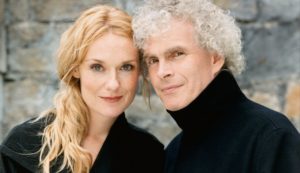
Waldebuehne 2018 Review: Magdalena Kozena Dazzles Alongside Sir Simon Rattle & Berlin Philharmonic
By Lois SilversteinSir Simon Rattle is retiring from the Berlin Philharmonic. Saturday night at the Waldbuehne, Berlin, was one of the farewell concerts. This one included his wife as guest artist – the superb mezzo-soprano, Magdalena Kozena.
Despite the rain that drizzled on the 20,000+ people armed with blankets and ponchos, and its proximity to the concrete tower left over from the former Nazi 1936 Olympic stadium now refurbished as a soccer field, the concert was more than festive. Even the famous Philharmonic Orchestra participated with the audience in a “WAVE” before the performance. Sir Simon’s program itself was eclectic with its international chestnuts – Gershwin’s Cuban Overture, Faure’s Pavane, Chatschaturian’s Gayeneh, and Respighi’s “Pini di Roma.” Magdalena Kozena’s contribution coupled well with these. She sang seven selections from Canteloube’s settings of Songs of the Auvergne, in the orchestral rather than the piano version, in which they were also scored. Her mezzo voice more than accented the mood, offsetting the full orchestral colors with her unique interpretations and reach. She sang with impeccable finesse and together with the orchestra created an incredible tapestry of sound.
Joseph Canteloube, folklorist and musician, as well as a native of the French Auvergne, created at least five volumes of compositions from traditional folk songs. As a child, he would walk the countryside with his father and record the music and the texts he heard. The original language of these songs is Occitan, an older version of French, which Cantaloube uses in his versions and which Kozena herself sang.
Stepping Into a Different Mood
The texts were not printed in the evening program, nor are they easily available. Those that are accessible give us an inside peek into the subject matter as well as the range of mood, tone and attitude with which they have been sung and lived by the people of the region for centuries. Many have performed these songs; singers as varied as Veronique Gens, Victoria de los Angeles, Renée Fleming, and Barbara Streisand. Kozena’s interpretation varied from piquant and saucy to melancholic and haunting.
Subtle and nuanced, the phrases of ordinary country people playfully singing and talking to each other as they go about their daily lives – shepherds and shepherdesses, spinners and farmers – a world tucked away from most of us today and yet not foreign to our central human relationships. That spectrum gave us a glimpse into Kozena’s telling penetration of the heart of a particular social world.
What Kozena brings was what gave the performance its unique perfume: cultivated simplicity, authentic and ancient. From another world, another place and time and circumstance.
Bailero
Particularly well-known is “Bailero,” a simple dialogue between two voices, a shepherd and a young girl out of sight. What we have here is old-fashioned flirtation – country-style, playful, touching, human. The music is at once simple and resonant. We recognize it and we are reminded: this is what human beings do, here, there, now, then. Kozena’s voice portrayed the gay pretense and charm of the young couple; touching and eloquent. We felt moved. Her eloquent phrasing and her clarity brought us into their world, with its perennial human delights. We may be sophisticated but at heart, we retain our naive ability to connect with another. For that transmission, Kozena was perfect.
Kozena stood at the end, open and vulnerable, looking beyond what was happening with complete frankness. As listeners, we are challenged to do the same. With her high artistic grace, Kozena was able to be at once simple and subtle. Nothing about these interactions could be dismissed. Nor should they be.
She’s Quite Special
What galvanizes about Koczena’s interpretation, let alone the voice itself, is its suggestibility. Rarely does she sing a phrase, legato or staccato without intention or without alluding to layers of meanings below and beyond. We are constantly suspended between what is and what may be, or has been, or will be. It is quite extraordinary. We don’t stop moving, shifting, like clouds or like wind, now here, now there. Not buffeted, but moving, lifting, looking.
While Kozena offered layered variety, she still sang from one central place, as if from the center of a rose – tendrils of feelings stretching outward, her facial expression, the tilt of her head, the look in her eyes, never veering off course. Multiple vistas emerged, delicate and thoughtful. How extraordinary – one voice and myriad perspectives. A wet and cold audience left the Waldbuhne warmed and won over by a haunting and irrevocably open heart.


